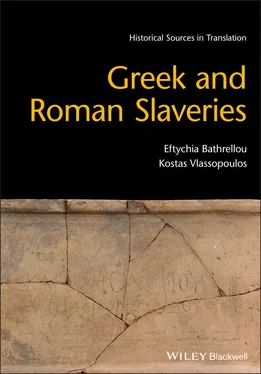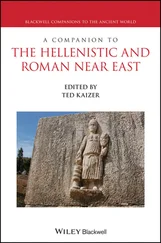What is the exception in this list of reciprocal obligations for Athenians and Spartans?
Who are the people referred to as slaves? How does this compare with Pollux’s definition in 1.3?
Why is there no reciprocal obligation for the Spartans to help the Athenians in the case of a slave revolt? What does this imply about differences between the Athenian and Spartan slave systems?
1.5 Thucydides, 8.40.2: Greek Historiography (Late Fifth Century BCE)
In 412/1 BCE, in the course of the Peloponnesian War, the Chians asked for Spartan help to revolt from the Athenians, who then tried to reconquer the island. On the slaves of Chios, cf. 9.24, 11.6.
Literature: Luraghi 2009; Lewis 2018: 139–41.
The Chians had many slaves – a greater percentage than any other city, except that of the Lacedaemonians. And because they were so many, the punishments they used to receive for their offences were harsher. So, when the Athenian forces seemed firmly established with a fortified base, the majority of the slaves immediately deserted to them and, as they knew the land well, it was they who caused the greatest harm.
Who are the slaves in Lacedaemon, who are compared with the slaves in Chios?
Does this description of the servile groups of Sparta differ from the way they are described in 1.3?
What makes possible the description of helots in such divergent ways?
Should we prefer one description to another?
How are Chian slaves treated? Why?
If Athenian chattel slaves were unlikely to revolt (1.4), how do Chian chattel slaves compare? How can we explain such divergence?
1.6 Strabo, Geography , 8.5.4: Greek Geography (End of First Century BCE/Early First Century CE)
Ancient authors tried to account for the origins of the helots. Here Strabo reports the views of Ephorus, a fourth-century BCE historian: according to his account, originally the Spartans were equal with the other communities of Laconia.
Literature: Vidal-Naquet 1986.
Ephorus says that (king) Agis, son of Eurysthenes, withdrew the equality and commanded everyone to pay tribute to the Spartans. All the others obeyed, but the Heleians, who had the city of Helos – and were called Helots – revolted. They were defeated totally in war and were condemned to be slaves on specified terms: namely, that their owner was not allowed to manumit them or to sell them outside the border. And this war was called the war against the Helots. We may almost say that it was those around Agis who established the helot system that persisted until the time of the Roman rule. For the Lacedaemonians held these men in a way as public slaves, having assigned to them some houses to live in and special services to perform.
How are the origins of the helots explained?
What conditions modified the slavery of the helots? What do you think were the reasons for such conditions?
How does Strabo try to conceptualize the peculiar slavery of the helots? With what does he compare them?
1.7 Plutarch, Spartan Sayings 239d–e: Greek Collection of Sayings (Late First/Early Second Century CE)
Literature: Hodkinson 2008; Luraghi 2009.
Lycurgus 15was thought to have secured for the citizens a fine and blessed good: abundance of leisure. For it was absolutely forbidden to touch manual work; moreover, there was no need at all of money-making, which involves painstaking accumulation, or of business activity, because Lycurgus had rendered wealth wholly unenviable and dishonorable. The helots worked the land for the Spartans, paying to them a part of the produce ( apophora ), which was regularly set in advance. A curse was in place against anyone who rented out the land for more, so that the helots might serve gladly since they were making some gain, and the Spartans themselves might not try to get more.
In which way did the Spartans benefit from the agricultural work of their helots? How did it differ from other forms of employing slaves in agriculture? Cf. 4.2–6.
How does Plutarch explain the reason for this arrangement?
Do you accept Plutarch’s explanation? What other explanations can you think for this arrangement?
Does this arrangement make helots completely different from chattel slaves? Cf. 12.18–9.
1.8 Plutarch, Life of Lycurgus , 28: Greek Biography (Late First/Early Second Century CE)
Literature: Luraghi 2002; Luraghi and Alcock 2003.
In other respects, too, the Spartans used to treat the helots harshly and cruelly, to the point that they would force them to drink great amounts of unmixed wine and introduce them to the communal messes, thus demonstrating to the young what it meant to be drunk. And they would order them to sing songs and dance dances ignoble and ridiculous and abstain from the songs and dances of the free. This is why they say that later, during the invasion of Laconia by the Thebans, 16when the Thebans would order the helots they captured to sing the songs of Terpander, Alcman, and Spendon the Spartan, they used to refuse, saying that their masters would not wish it. So those who say that in Lacedaemon the free man is freest, while the slave is most a slave, have correctly gauged the difference.
How did the Spartans try to humiliate the helots?
Why did the Spartans enforce such practices on the helots?
What example does Plutarch cite to show the effects of such practices on slaves?
Does Plutarch think that helots were “between slave and free”? Cf. 1.3.
What do you think?
1.9 Aristotle, Politics , 1264a17–22: Greek Philosophical Treatise (Fourth Century BCE)
Aristotle draws attention to the vagueness of Plato’s Republic about whether the ideal of communal property would apply to all the classes in the ideal city or to the guardians only.
Literature: Lewis 2018: 147–65.
If everything is common to all in the same way as among the guardians, then in what way will the farmers be different from the guardians? Or what benefit will there be to those who submit themselves to their rule? Or on what consideration will they submit themselves to the guardians’ rule unless the guardians think of a clever idea similar to that of the Cretans? For the Cretans have allowed to their slaves everything they allow to themselves, with only two exceptions: they forbid them to use the gymnasia and possess weapons.
What activities are prohibited to Cretan slaves? Why?
Does this necessarily mean that Cretan slaves were better treated than Spartan helots?
Does the description “between slave and free” (see 1.3) fit Cretan slaves better than helots?
1.10 Ps.-Xenophon, Constitution of the Athenians , 1.11–2: 17Greek Political Treatise (Probably Fifth Century BCE)
This text, while critical of Athenian democracy, attempts to offer a sociological analysis of why the Athenian system works and is difficult to overthrow.
Literature: Vlassopoulos 2007; Canevaro 2018.
If anyone is also surprised at the fact that here they allow their slaves to live in luxury and, some of them, magnificently, they could be shown to be doing this too with good reason. For where there is a naval power, it is necessary for financial reasons to be slaves to the slaves − so that we may receive the payments ( apophora ) the slaves make − and then to let them free. “But in Lacedaemon, my slave would have been in fear of you!” But if your slave is in fear of me, there will be a risk that he might even give his money so as not to be in danger. Where there are wealthy slaves, it is no longer useful that my slave should be in fear of you. This is why we established equality of speech between slaves and free men and between metics and citizens.
Читать дальше












